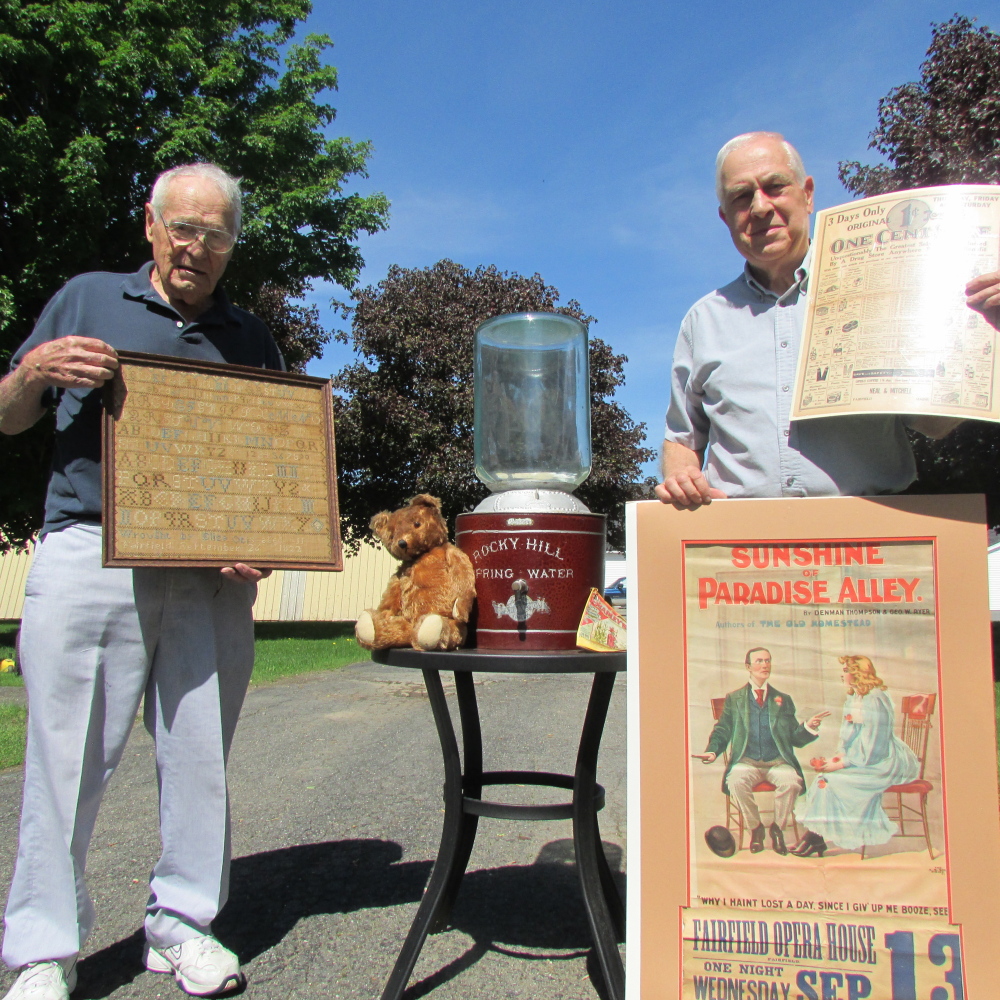FAIRFIELD — It’s the job of historical societies to help keep the memory and history of small towns alive, but finding and buying the items that fill local museum collections sometimes can be a struggle.
Fairfield has been fortunate enough to benefit from the generosity of Arthur Julia, a native antique collector who for years has helped fill the society’s collection with unique local artifacts.
In his most recent donation, Julia again has helped the town hold on to its past.
Last month, Julia gave the society a grab bag of valuable items including a 19th-century sewing sampler, a poster from a production at the Fairfield Opera House and an early 20th century cooler for spring water from the town.
It’s an important donation for the society’s collection and a symbol of Julia’s generosity, said Doug Cutchin, president of the Fairfield Historical Society.
“Arthur has given us a lot over the years,” Cutchin said.
The historical society will hold a special event on Saturday, July 11, from 10 a.m. to 1 p.m. at the Fairfield History House, at 42 High St., to show off its new acquisitions and celebrate “food from the past,” including homemade doughnuts, ice cream and taffy.
Julia, now 88, grew up in Hinckley. His interest in antiques started with trying to furnish the home he bought in Fairfield, but it didn’t take long for him to turn hunting for inexpensive furniture into a hobby, and then a career. He collected enough antiques that he started selling them at his home and eventually left his job at an insurance company to get into the business full time.
Jim Julia, his son, bought the local business in the 1980s and turned it into the nationally recognized auction house, James D. Julia Inc.
As he gets older, Arthur Julia is shedding some of his collection, but he wants to make sure the items enhance people’s appreciation of Fairfield’s history.
“I was born and raised here. It looks like I’m going to die here,” Julia said. “These things should stay in Fairfield. It’s important for them to remain in town.”
Julia’s gift is doubly important, given the difficulty of locating important historical pieces and the expense of procuring them.
“Not only are these things hard to find, but once you find them, can you afford them?” Cutchin said. “We’re not a rich society.”
The intricate sewing sampler was produced by young women to show off their talents with needle and thread. The cloth features the letters of the alphabet, sewn in different sizes and styles.
“Needlecraft was very important, because they had to make all their own clothes,” Jim Julia said. The samplers were the equivalent of a “young girl’s master thesis” during the period, he said.
According to the signature sewn into the bottom of the sampler, it was completed by Eliza Otis in Fairfield in September 1822. It will join another sampler by Fanny Low from 1834, which the society acquired years ago.
Compared to samplers produced from monied families from the city, Otis’ sampler is plain, Julia said, but it has important historical value for Fairfield. The Otis family was settled in Fairfield by the 1780s at the earliest, and it was an important family in the new town, then called Kendall’s Mills.
The other items are also significant. The red glass-and-metal water cooler dates back to at least 1900 and is emblazoned with the name Rocky Hill Spring Water, a Fairfield water company. It’s the same type of device that was in the Gerald Hotel when it opened in downtown Fairfield, Jim Julia said. There’s also a poster for a performance of “Sunshine of Paradise Alley,” a musical performed in the late 1800s at the Fairfield Opera House. It’s one of the few opera house posters left.
“All the time I’ve been in the business, that poster and the one you have down at the society are the only two I’ve seen,” Arthur Julia said.
He also has donated a child’s teddy bear, a farming catalog, a poster advertising a 1-cent sale at the Rexall Drug store in town and a gentleman’s pocket watch.
Building its collection helps the society educate and inform residents about the town’s history and make it relevant to their lives, Cutchin said.
Nothing irritates him more than the fact that people don’t realize that Fairfield was once a thriving industrial center with a regionally recognized luxury hotel, the Gerald.
“I only taught for two years, but the one thing that irritated me about my students is that they thought Maine, and Fairfield in particular, was a backwater,” Cutchin said. “Nothing could be further from the truth.”
Peter McGuire — 861-9239
Twitter: PeteL_McGuire
Send questions/comments to the editors.




Success. Please wait for the page to reload. If the page does not reload within 5 seconds, please refresh the page.
Enter your email and password to access comments.
Hi, to comment on stories you must . This profile is in addition to your subscription and website login.
Already have a commenting profile? .
Invalid username/password.
Please check your email to confirm and complete your registration.
Only subscribers are eligible to post comments. Please subscribe or login first for digital access. Here’s why.
Use the form below to reset your password. When you've submitted your account email, we will send an email with a reset code.